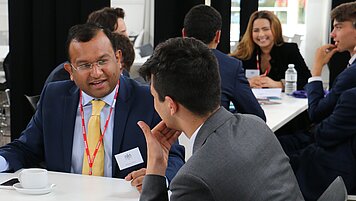


Merchant Taylors’ School Careers
MTS is committed to providing the highest quality of careers guidance for all pupils. As part of this on-going commitment, we are currently in the process of applying for recognition that our programme meets the national validation of excellence available for England, the Quality in Careers Standard (QiCS), through the Investor in Careers award.
The Careers Department has a three-person team which is housed in a purpose-built facility adjacent to Reception, but most importantly at the heart of the School. The full-time Head of Department is assisted by two colleagues, one of whom takes a lead in organising specific events, the other oversees Young Enterprise and Work Experience.
The role of the department is to help all pupils build a solid foundation for their future careers. By helping them to understand their aptitudes and abilities, skills and interests we aim to support the transition from school to university, apprenticeships and into the working world. Part of the whole school’s commitment to encouraging breadth of opportunity and motivation to follow their passions, we aim to translate pupils’ time at MTS into education and career decisions that will be rewarded with fulfilment and success.
Particular strengths of the Department include.
- Careers programme involves all boys from Year 7 to Year 13.
- Strong links with OMTs at University and beyond who regularly come back to their "Alma Mater" to share experiences and offer advice.
- Personal careers interviews available to all boys on request.
- Careers activities incorporated into core curriculum and co-curricular programmes.
- Integration with pastoral system to provide personalised support and guidance throughout boys' career journey through school.
- Close ties with Sixth Form to align university/other destinations after MTS with career plans.
- Dedicated work experience coordinator helps support boys to find relevant opportunities across a wide range of industry sectors.
- All boys plus their parents have individual meetings with Careers staff in Year 11 to review Morrisby profile feedback and review A level/career plans.
- Close contacts with alumni and other employers provide opportunities for careers insights and advice through wide variety of events and meetings.
- Participation in Enterprise events at each school stage culminating in setting up their own businesses to compete in national Young Enterprise programme in Year 12.
Each year group has a Careers Programme which is modified and updated annually as necessary in the light of pupil feedback.
The school's Careers Education, Information, Advice & Guidance (CEIAG) policy can be found here:
Details of students' overall careers education entitlement can be found here:
Parents, carers and guardians play an important part in the career and education choices of young people and there are increasing options for navigating the onward journey from school into higher education, apprenticeships or work. Below is a selection of on-line resources to help parents have discussions about these options with their children, using information that is as accurate and current as possible. If you are looking for something specific that is not covered here, please get in touch via careers@mtsn.org.uk
All MTS pupils also have access to career-related information including work experience and career insight opportunities via the ‘Careers at MTS’ website on the student MyMTS portal. Pupils in 4ths upwards have a personalised Morrisby profile which includes a large library of information on different careers, including video clips, links to professional bodies, information on key qualifications needed and possible pathways into the career.
Finally, all pupils can access a wide range of personal career-related guidance support from the Careers office, including help finding or preparing for work experience, support with cv writing and applications, general and specific careers information, support around university choices as well as career and education decision making. Pupils can email careers@mtsn.org.uk for an appointment, or simply pop into the Careers office to speak to us directly during break or lunchtimes.
* The word ‘parent’ is used to refer to parents, carers and guardians
General websites
Parental Guidance: This site offers a range of general careers information and advice and is produced and updated by the Careers Writers Association.
Career Mag for Parents: Published by Careermap, this online magazine supports parents with advice and guidance on careers and further education choices.
National Careers Service: This government website is a national resource for all ages and stages and has useful sections on many topics including skills development, volunteering, gap year planning, career research, work experience, and support for people with disabilities entering education or work.
University applications
UCAS University Guide for Parents: UCAS, the Universities and Colleges Admissions Service, is the UK's shared admissions service for higher education. There is lots of excellent support information on the UCAS website for making post-18 choices including this guide specifically aimed at parents.
Guardian University League Table and The Complete University Guide are two well regarded league tables. There is no single league table that is ‘the best’. Each publisher takes a slightly different approach to calculating their rankings. Also important to note is that the overall institution league table position does not always reflect the positions of all subject courses at that institution.
UCAS: Student Finance - Guide for Parents Attending university has a cost. This parent guide using information from Student Finance England (SFE) is published by UCAS.
Apprenticeships (including Degree Apprenticeships)
Amazing Apprenticeships Amazing Apprenticeships is a leading apprenticeship organisation working with education and employers. Their website contains lots of excellent resources including monthly ‘parent packs’ and podcasts.
RateMyApprenticeship.co.uk This site bases its information on ratings from apprentices. It has a parent’s guide section among lots of other useful information.
Labour Market Information
Graduate employment prospects are one of the factors often used to select university courses. High Fliers research publish reports about the graduate market compiled from interviews with over 12,000 graduates who left university the previous year.
The Edge Foundation produces a regular series of Skills Shortage Bulletins exploring skills shortages across key areas of the economy.
‘Work experience’ advice and support
Having experiences of workplaces as they progress through school is a key part of pupils’ exploration of the world of work and development of a sense of their future selves. The traditional concept of a ‘work experience placement’ – 1 or 2 weeks in a workplace – has been superseded by a variety of options since the pandemic. Sometimes it is not reasonable or practical for an organisation to take young people into their work location for an extended period, particularly if their environment is potentially hazardous or if employees now work remotely.
At MTS we encourage all pupils to progressively engage in finding out about workplaces through a variety of experiences. A very important part of the learning around such experiences is organising them; so, like most schools, we support pupils to arrange their own opportunities and placements. This can include applying for organised schemes, writing speculative letters and cvs plus networking with family and other contacts.
The MTS Careers office provides extensive advice and support for finding opportunities, writing applications, interview practice and reflecting afterwards. We can write letters of reference if required by an employer. Pupils in any year can arrange a personal support session by dropping into the office at break or in the Hour or by emailing careers@mtsn.org.uk
All the work insight opportunities the Careers team finds for MTS pupils to apply for are published on the Careers at MTS website. These are presented in good faith - we do not arrange or approve these experiences and we do not ‘vet’ the organisations offering them. Attendance at experiences is expected to take place outside of term time, and with parental approval.
How to make organise positive experiences
Be clear why you’re doing it
Before arranging an experience, it is helpful to consider its purpose or objective. Most usually this includes one or more of the following:
- Developing understanding of workplace behaviours and expectations
- Developing specific practical skills
- Improving awareness of different careers, roles and sectors
- Developing their personal network
- Preparing for online recruitment processes
Make it meaningful
Experiences of workplaces can include work visits, work shadowing and/or work experience. For it to be most meaningful for the pupil, they should:
- consider up front what they want to learn from the experience and ensure it is suitable for their age and needs
- be able to meet a range of people from the workplace
- be able to have a productive, two-way interaction between themselves and the employee(s)
- be able to perform a task or produce a piece of work relevant to that workplace and receive feedback on it from the employee/employer
- reflect on what they have learned at the end of the activity and use this to inform future experiences
Types of activities
The range of activities that can meet these objectives is wide. Things that can be considered include:
- An immersive virtual or physical tour of an organisation; meeting staff and understanding their individual roles/qualifications/careers journeys etc with opportunities for Q&A; carrying out a task or reflective activity
- ‘Careers journey’ or ‘roles and responsibility’ speed dating with a range of employees in an organisation, either virtually or physically, followed by a reflective activity
- Virtual experience where pupils hear from different employees and undertake a task offline and then submit for feedback
- Volunteering with charities or social action projects with an allocated role and support/ feedback from the employer
- A virtual or physical tour of an organisation to focus on the journey of a product or process within the organisation with a focus on the roles and responsibilities of employees at each stage, followed by a reflective activity
- A placement over a half-day or more at a place of work with clear expectations set and opportunities to speak with different employees and carry out (or observe) some typical tasks (with reflection)
- A simulated experience of a typical scenario or situation that would be found in that work environment with the opportunity for Q&A with employees
- Shadowing an employee for part of their working hours with an opportunity for Q&A and a task and/or reflection (this can be done where parents or relatives are working from home).
Reflection and feedback
Reflection is one of the most important elements of the process and should be undertaken for all experiences. Help with reflection approaches is available from the Careers office.
Where it is not possible to undertake a task specific to the workplace (for example in a healthcare situation, a law court or an engineering environment), pupils should write a reflective diary that they could share all or some of with the employer to get feedback. The diary should include:
- a summary of what they observed or found out from the experience
- a summary of what they learned about different roles, the workplace or themselves
- notes for themselves on what they would like to do next to build on this learning
- space for feedback from the host of the experience.
Lower School Super Curricular Programme
As part of this programme, pupils explore the following topics:
1 What is a career?
- The difference between career and job; what makes a ‘good’ career.
- Confronting stereotypes in careers.
- The factors that help give us a positive career.
2 What does the future of work look like?
- 4th Industrial Revolution and its impact on the world of work.
- Trends in STEM and global development, climate change, politics and society and their impact on the world of work in the next 10 -20 years.
3 How can school help us prepare for our future after school?
- Knowledge vs Skills.
- Qualifications vs Experience.
- Learning to learn.
- Skills through subjects.
- Importance of co/extracurricular in building employability skills.
In addition, all Thirds pupils take part in a Careers & Enterprise Day in the Summer term to help develop core Employability and Enterprise skills including:
- Communication/Presentation.
- Teamwork.
- Planning.
- Entrepreneurship.
- Financial thinking.
- Working under pressure.
Careers in the Curriculum and Co-Curriculum
The Careers department runs a number of careers talks and assemblies that are open to pupils across the school and works with Co-Curricular clubs to bring in careers speakers relevant to those clubs. Pupils in the Thirds are invited to these events wherever possible.
Lower School Super Curricular Programme
As part of this programme, pupils explore the following topics:
1. Standard of Living
- Factors affecting this including redundancy, work/life balance, minimum wage etc.
2. Job satisfaction
- Factors affecting this including work/life balance, suitability of role, career expectations.
3. Personal budgeting
- Needs vs wants, expenditure vs income.
4. Risk and enterprise
- Exploring and managing risk vs reward.
- Entrepreneurship.
In addition, all Upper Thirds pupils take part in a Careers & Enterprise Day in the Summer term to help develop core Employability and Enterprise skills including
- Communication/Influencing/Negotiating.
- Teamwork.
- Problem solving.
- Creativity.
- Critical Decision making.
- Working to deadlines.
Careers in the Curriculum and Co-Curriculum
The Careers department runs a number of careers talks and assemblies that are open to pupils across the school and works with Co-Curricular clubs to bring in careers speakers relevant to those clubs. Pupils in the Upper Thirds are invited to these events wherever possible.
As part of their programme of preparation for GCSE choices, all pupils take part in an off-timetable Careers Inspirations Day (Spring Term). The focus of this day is to:
- improve their self-awareness and explore the importance of this to career choices.
- improve their awareness of different jobs and careers and the educational and skills requirements they may have.
- develop their decision-making capabilities around education and career decisions.
During this day, pupils meet and interview a number of OMTs and parents as part of a ‘speed networking’ activity.
Careers in the Curriculum and Co-Curriculum
The Careers department runs a number of careers talks and assemblies that are open to pupils across the school and works with Co-Curricular clubs to bring in careers speakers relevant to those clubs. Pupils in the Fourths are invited to these events wherever possible.
All Divisions pupils take part in a Careers & Enterprise Day in the Summer term to help develop core Employability and Enterprise skills including.
- Communication/Influencing/Negotiating.
- Teamwork.
- Problem solving.
- Creativity.
- Critical Decision making.
- Commercial awareness.
Morrisby Profiling (Summer term)
All pupils undertake the Morrisby profiling assessments designed to help improve self-awareness and understanding of career and educational pathways.
Careers in the Curriculum and Co-Curriculum
The Careers department runs a number of careers talks and assemblies that are open to pupils across the school and works with Co-Curricular clubs to bring in careers speakers relevant to those clubs. Pupils in the Fourths are invited to these events wherever possible.
All Fifth Form pupils meet individually with a member of the Careers team who supports them through the process of exploring careers based on their Morrisby profile. These discussions also explore post-16 and university options where desired career pathways have specific educational requirements, together with work experience and volunteering.
Middle School PSHE programme
All pupils take part in lessons focused on work experience and cv writing.
Work Experience
All pupils are encouraged and supported to undertake work experience and/or volunteering in the summer after GCSEs have been sat.
Careers in the Curriculum and Co-Curriculum
The Careers department runs a number of careers talks and assemblies that are open to pupils across the school and works with Co-Curricular clubs to bring in careers speakers relevant to those clubs. Pupils in the Fifths are invited to these events wherever possible.
Careers Guidance
In the Sixth Form, careers guidance support is managed much more on an individual basis with the pupils taking the lead.
All pupils can book individual consultations with the Careers department for careers guidance, support with finding and applying for work experience or volunteering, cv writing, interview techniques and any other career-related questions. Our door is always open, and many pupils with simple queries just pop in for a quick consultation at break or in study periods.
University Applications
Pupils at MTS progress to leading universities in the UK and overseas. The Head of Sixth Form and her team of UCAS Advisers support pupils through the process of deciding on courses, completing competitive applications and preparing for interviews. We also have a US Universities Adviser on the school staff. The personalised UCAS support includes:
- Academic enrichment and extension lessons and tutorials.
- Support for academic entrance tests where applicable.
- Personal Statement workshops.
- Lectures, group and individualised support including how to research and choose university courses, finance for students, health and wellbeing when living independently, preparation for results days.
- Organised university visits and authorised absence for open days.
- Interview preparation.
- Preparation for Results Days and Results Day support.
Higher/Degree Apprenticeship Applications
This process runs separately from UCAS and each company has their own process. The Head of Careers provides personalised support to those students who wish to apply for higher or degree apprenticeships and school leaver programmes.
Work Experience
All pupils are encouraged and supported to undertake additional work experience and/or volunteering during the Sixth Form.
Sixth Form PSHE and Lecture programmes
All pupils participate in a structured programme of lessons, lectures and off timetable days which prepare them for life after MTS.
Careers in the Curriculum and Co-Curriculum
The Careers department runs a number of careers talks and assemblies that are open to pupils across the school and works with Co-Curricular clubs to bring in careers speakers relevant to those clubs. Some of these events are specifically aimed at Sixth Form pupils to help them explore their career interests in more depth.